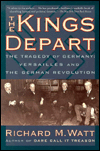
I just finished reading The Kings Depart: The Tragedy of Germany Versailles and the German Revolution by Richard M. Watt. The Kings Depart describes the people and events that influenced the end of World War I and its aftermath. This thoroughly researched story provides the reader with great insight into what events transpired as well as how and why they transpired. Watt certainly believes that each of the actor’s backgrounds, personalities, and interpersonal skills played an important part in these events. Before describing many of the events and interactions in this period, Watt provides bibliographic sketches of each of the important players such as Woodrow Wilson, Lloyd George, and Georges Clemenceau, as well as Friedrich Ebert Germany’s first socialist Chancellor. Watt uses each player’s biography to place their interactions with others and their reaction to events within the context of their lives. I have long believed that individuals have great power in influencing events so I really appreciated this mixing of biography and more classical history.
The Kings Depart certainly depicts a few battlefield conflicts, but more importantly it depicts the negotiations that lead to the Versailles Treaty and the Socialist Revolution in Germany. Watt clearly understands how negotiations work and did an excellent job of depicting each person’s individual negotiating style. In particular, Watt details Woodrow Wilson’s failure in his negotiations with George and Clemenceau over the form of the peace treaty, which ultimately reflected George’s and Clemenceau’s desire for revenge more than Wilson’s Fourteen Points. Watt attributes this to Wilson’s propensity to become mired in details, his refusal to delegate to his team, and ultimately his failing health.
The piece of history that I knew almost nothing about was the revolution that occurred in Germany once it became apparent that Germany would lose the war. Essentially almost every unit in the Imperial Army and Navy mutinied against their officers and took up the red flag of socialism and almost the entire country went on strike to protest rule by the Emperor. Watt describes the various states of anarchy that prevailed in many of Germany’s cities during this period and the various attempts that the government made to restore order. This story alone gives new meaning to the words order, discipline, and organization because it illustrates their polar opposite. Also interesting are the fissures that formed when the opposition Socialists found themselves actually running the government. These fissures formed between those who took responsibility to try to establish some sort of order and the true socialist believers whose concept of reality was actually utopian. In my lifetime, socialism has been more of a slur than a political ideology so this portion of the story helped to illustrate the various intellectual schools that once existed.
Finally and tragically, Watt describes the deep misgivings that many members of the allied parties had with the treaty that the Allies forced Germany to sign, Herbert Hoover and John Maynard Keynes among them. Of course everyone knows how this story ends, so Watt details Adolph Hitler’s periphery role in these events and how that setup his eventual rise to power.

No comments:
Post a Comment